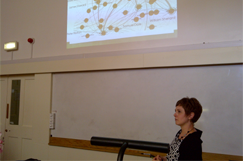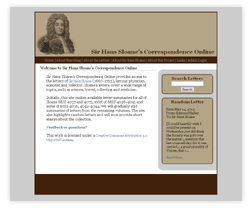* You are viewing Posts Tagged ‘History of Medicine’
 It’s an exciting time for friends and colleagues at Dublin’s Edward Worth Library – a collection of 4,500 books, left to Dr Steevens’ Hospital by Edward Worth (1678-1733), an early eighteenth-century Dublin physician – who have contacted us with two reminders:
It’s an exciting time for friends and colleagues at Dublin’s Edward Worth Library – a collection of 4,500 books, left to Dr Steevens’ Hospital by Edward Worth (1678-1733), an early eighteenth-century Dublin physician – who have contacted us with two reminders:
A conference on The Reception of Newton will be held at the Library on 12–13 July 2012. In recent years, considerable attention has been devoted to the elucidation of the precise nature and scope of Newton’s influence on eighteenth-century science in particular, and on Enlightenment culture more generally. The Library is uniquely positioned to contribute to this ongoing reassessment, as its holdings bear unique witness to the spread of Newtonianism in Ireland. Worth’s collection reminds us of the range and depth of Newton’s intellectual impact on Europe and the crucial role played by second generation Newtonians in clarifying, classifying and re-presenting his ideas. The deadline for 300 word abstracts is 1 March 2012; for further details, see the conference website.
The Library is also offering a single one-month fellowship to be held in 2012, to encourage research relevant to its holdings. The collection is particularly strong in three areas: early modern medicine, early modern history of science, and, given that Worth was a connoisseur book collector interested in fine bindings and rare printing, the history of the book. Research does not, however, have to be restricted to these three key areas. Further information about the collection and its catalogues may be found on the library website. The closing date for applications is 30 March 2012. For further details and application procedures please contact: Dr Elizabethanne Boran, Librarian, The Edward Worth Library, Dr Steevens’ Hospital, Dublin 8, Ireland (elizabethanne.boran[at]hse.ie).
James Brown
June 26, 2011
Events, Lectures, Project Updates
Tags: Databases, Eighteenth Century, Hans Sloane, History of Medicine, History of Science, Networks, Seventeenth Century, Visualization

Dr Smith during her talk.

For the seventh and penultimate paper of our seminar series on Thursday 16 June, Dr Lisa Smith (University of Saskatchewan) described her recent efforts towards ‘Visualizing Hans Sloane’s Early Correspondence Networks’. Despite neglect in the historiographies of medicine and science, Smith described Sloane as a facilitator or ‘supermediator’ central to the activities of the early Royal Society as well as the lives of his patients, who corresponded voluminously despite his small number of formal publications. Indeed, Smith is in the process constructing a relational database of Sloane’s many letters – Sir Hans Sloane’s Correspondence Online – which she demonstrated during the talk, and which provided the raw data for the network visualizations. Emphasising that the resource is a work in progress (although an impressive 1,641 letters have been catalogued so far), Smith described the ‘back’ and ‘front’ ends of the catalogue – like our own digital resource, a sophisticated editorial interface sits beneath the search and browse functions – which allows users to explore and filter the Sloane corpus by a full range of standard epistolary metadata as well as a variety of medical themes and keywords, both contemporary and modern. Transcriptions are also being made available, while digital images of the original manuscripts are also in the pipeline. In the second half of her talk, Smith used visualizations of the data created with the recent Yifan Fu algorithm to explore several of the most interesting networks revealed by the correspondence; a surprisingly continental set of relationships, in which connections of patronage, marriage, and friendship loom large. Smith concluded by arguing that network visualizations derived from large datasets are vital in revealing intricacies and overlaps between groups of individuals which would not otherwise have been perceivable, and are of special value in highlighting clusters of relationships (or networks within networks) which can then be reconstructed in more detail. Seminars take place in the Faculty of History on George Street on Thursdays at 3pm. For future talks in the series, please see the seminar webpage.
 Podcast now available on the seminar page!
Podcast now available on the seminar page!
James Brown
February 21, 2011
Project Updates, Publications, Websites and Databases
Tags: Bodleian Resources, Europe, France, History of Medicine, Martin Lister, Montpellier, Networks, Seventeenth Century
 In 1663, Martin Lister left his parents’ house in Burwell, Lincolnshire to study medicine in Montpellier. Whilst in France, he kept a journal in an almanac entitled Every Man’s Companion: Or, An useful Pocket-Book (MS Lister 19, Bodleian Library).
In 1663, Martin Lister left his parents’ house in Burwell, Lincolnshire to study medicine in Montpellier. Whilst in France, he kept a journal in an almanac entitled Every Man’s Companion: Or, An useful Pocket-Book (MS Lister 19, Bodleian Library).
Month by month, Lister noted the medical texts he consulted (and the French romances and comedies he read) in this thin octavo, and annotated the recipes given to him when he lodged with an apothecary. He described the personalities and works of luminaries he met in France including William Croone, Nicolas Steno, and John Ray. Lister performed a series of dissections with Steno, as well as going on natural history expeditions with Ray. Lister also attended the salon of Sir Thomas Crew to discuss ornithology, medicine, and literature, mixing with other fellows of Cambridge and English expatriates. As his time in Montpellier was part of his education as a gentleman, Lister made detailed notes about his visits to gardens and libraries in Paris, manufacturing methods, viniculture, literature and drama, and rules of politesse and art connoisseurship.
Dr Anna Marie Roos, our Lister Research Fellow, has recently been awarded a British Academy Small Research Grant to create a textual edition of the pocketbook with appropriate apparatus. To annotate the edition, she will also utilize 25 pages of memoirs of Lister’s time in Montpellier and 43 pieces of Lister’s French correspondence in the Bodleian Library and in France. As the account of Lister’s journey is so detailed, his grand tour and memoirs will also be recreated as an interactive website using maps, images, and texts, providing a virtual introduction to an early modern medical education.
 The Edward Worth Library, Dublin, is offering a single one-month fellowship to be held in 2011, to encourage research relevant to its collections. The Worth Library is a collection of 4,500 books, left to Dr Steevens’ Hospital by Edward Worth (1678-1733), an early eighteenth-century Dublin physician. The collection is particularly strong in three areas: early modern medicine, early modern history of science and, given that Worth was a connoisseur book collector interested in fine bindings and rare printing, the History of the Book. Research does not, however, have to be restricted to these three key areas. Further information about the collection and our catalogues may be found on the library’s website. The closing date for applications is 14 April 2011. For further details and application procedures please contact: Dr Elizabethanne Boran, Librarian, The Edward Worth Library, Dr Steevens’ Hospital, Dublin 8, Ireland (elizabethanne.boran[at]hse.ie). You can download the advertisement here (doc).
The Edward Worth Library, Dublin, is offering a single one-month fellowship to be held in 2011, to encourage research relevant to its collections. The Worth Library is a collection of 4,500 books, left to Dr Steevens’ Hospital by Edward Worth (1678-1733), an early eighteenth-century Dublin physician. The collection is particularly strong in three areas: early modern medicine, early modern history of science and, given that Worth was a connoisseur book collector interested in fine bindings and rare printing, the History of the Book. Research does not, however, have to be restricted to these three key areas. Further information about the collection and our catalogues may be found on the library’s website. The closing date for applications is 14 April 2011. For further details and application procedures please contact: Dr Elizabethanne Boran, Librarian, The Edward Worth Library, Dr Steevens’ Hospital, Dublin 8, Ireland (elizabethanne.boran[at]hse.ie). You can download the advertisement here (doc).
 It’s an exciting time for friends and colleagues at Dublin’s Edward Worth Library – a collection of 4,500 books, left to Dr Steevens’ Hospital by Edward Worth (1678-1733), an early eighteenth-century Dublin physician – who have contacted us with two reminders:
It’s an exciting time for friends and colleagues at Dublin’s Edward Worth Library – a collection of 4,500 books, left to Dr Steevens’ Hospital by Edward Worth (1678-1733), an early eighteenth-century Dublin physician – who have contacted us with two reminders:


 In 1663,
In 1663, 
 Join
Join 